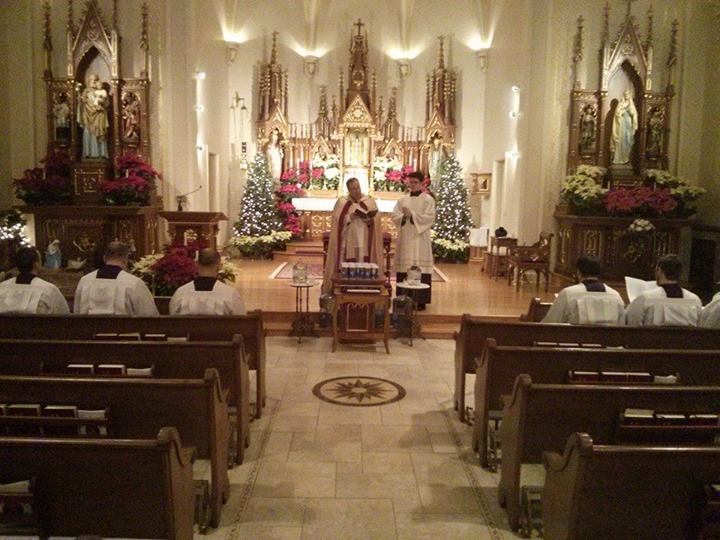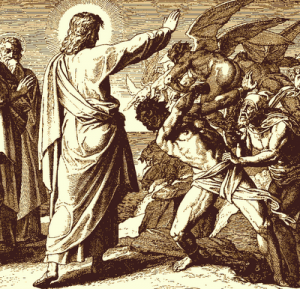Wonderful customs come with the Feast of the Epiphany. Real Epiphany is 6 January, by the way. Happily, this year it doesn’t get transferred to a Sunday because it falls on a Sunday.
On Epiphany we find in the Roman Ritual a blessing for gold, frankincense and myrrh. Please bring all your spare, unblessed myrrh to your priest… and your gold. Bring lots of gold to your priest… or send it to me if your priest isn’t around.
By the way, we use pure frankincense in our thurible. I just bought a bunch more which I will bless. I also have a bag of real myrrh.
On Epiphany there is also the famous blessing for homes. Father can bless chalk which can be used then to mark the lintel of the house with the year.
However, today, on the Vigil of Epiphany, there is a special blessing for Epiphany Water. Here is a photo from a couple years ago, of yours truly blessing Epiphany Water.

I will bless a lot more tonight.
The Rite is very cool. It begins with the Litany of Saints, with a couple special petitions about the blessing of the water to follow. Satan and the demons are then driven from the place with a mighty prayer.
This is NOT a prayer for lay people to recite. Period. Understand? Just don’t.
Exorcism against Satan and the apostate angels [In Latin, of course. The “+” is where the celebrant makes the Sign of the Cross.]
In the name of our Lord Jesus + Christ and by His power, we cast you out, every unclean spirit, every devilish power, every assault of the infernal adversary, every legion, every diabolical group and sect; begone and stay far from the Church of God, from all who are made in the image of God and redeemed by the precious blood of the divine + Lamb. Never again dare, you cunning serpent, to deceive the human race, to persecute the Church of God, nor to strike the chosen of God and to sift them as + wheat. For it is the Most High God who commands you, + He to whom you heretofore in your great pride considered yourself equal; He who desires that all men might be saved and come to the knowledge of truth. God the Father + commands you. God the Son + commands you. God the Holy + Spirit commands you. The majesty of Christ, the eternal Word of God made flesh + commands you; He who for the salvation of our race, the race that was lost through your envy, humbled Himself and became obedient even unto death; He who built His Church upon a solid rock, and proclaimed that the gates of hell should never prevail against her, and that He would remain with her all days, even to the end of the world. The sacred mystery of the cross + commands you, as well as the power of all the mysteries of Christian faith. The exalted Virgin Mary, Mother of God + commands you, who in her lowliness crushed your proud head from the first moment of her Immaculate Conception. The faith of the holy apostles Peter and Paul and the other apostles + commands you. The blood of the martyrs and the devout intercession of all holy men and women commands you.
Therefore, accursed dragon and every diabolical legion, we adjure you by the living + God, by the true + God, by the holy + God, by the God who so loved the world that He gave His only-begotten Son, that whoever believes in Him shall not perish but shall have life everlasting; cease your deception of the human race and your giving them to drink of the poison of everlasting damnation; desist from harming the Church and fettering her freedom. Begone Satan, you father and teacher of lies and enemy of mankind. Give place to Christ in whom you found none of your works; give place to the one, holy, Catholic, and apostolic Church, which Christ Himself purchased with His blood. May you be brought low under God’s mighty hand. May you tremble and flee as we call upon the holy and awesome name of Jesus, before whom hell quakes, and to whom the virtues, powers, and dominations are subject; whom the cherubim and seraphim praise with unwearied voices, saying: Holy, holy, holy, Lord God of hosts!
The salt and water are exorcised, blessed, blended.
Thus, all these elements are ripped from the domination of the Prince of this world and handed over wholly to the King, ready for use in our spiritual warfare.
At the end of the rite the Te Deum is sung. Spiffy.
Epiphany and its Vigil, once more important than Christmas. Very ancient and very cool feast.



































What’s your opinion on the Ordinary’s permission being necessary vel non for the Epiphany water blessing?
This is a powerful rite and one of the things that made Catholicism so attractive to me. I have only seen it done once that I can recall in our Catholic dead zone, New England. I keep using the chalk from about four years ago to update the year on the house. It was the only time I recall this being done locally. Thank you for keeping it alive somewhere Father Z.
If I may, Father, I think your 26 Jan 2012 post covers this.
In 1964 by Inter Oecumenici all reserved blessings except a few specific ones were granted to all priests. The water blessing for the Vigil of Epiphany was not among the exceptions. Thus it would seem all priests can use it. It would not seem to require permission any longer.
Exorcisms are not included among the grant so are still reserved if not part of another rite that is no longer reserved, it would seem.
Here’s the rub on “Inter Oecumenici”: if it’s applicable with respect to reserved blessings, then I hope Fathers relying on that are also omitting Psalm 42, the Last Gospel, Leonine Prayers, solita oscula, multiple signs of the Cross in the Canon, and only saying “Corpus Christi” when distributing Holy Communion.
You can’t pay attention to the parts you like and ignore the rest.
I’d argue “Inter Oecumenici” is not law at all in light of “Summorum Pontificum” directives on liturgical law in place in 1962.
For reasons unbeknownst to me our priest did the Blessing of Epiphany Water after our morning Mass today. I was always under the impression that it was supposed to be done after Vespers the evening before, which is when we used to always do it before.
WmHesch says: I’d argue “Inter Oecumenici” is not law at all in light of “Summorum Pontificum” directives on liturgical law in place in 1962.
We find ourselves on shaky ground when we try to hold that an official document of the Church which expresses liturgical law “is not law at all”
I would submit that you have not understood the import of Summorum Pontificum correctly.
Pope Benedict told us that the previous liturgical books had never been abrogated. This means that the directives still have force where they have not been modified or replaced by later directives. Many of those reserved blessings (including the Blessing of Epiphany Water) have no counterpart in the newer “Book of Blessings” and so they still hold force even now.
According to Summorum Pontificum’s declaration, this was true before SP was issued. This document merely clarified this point.
IO does not have (or not have) the status of liturgical law because of SP. IO is liturgical law simply because it is an authentic expression of the Church’s liturgical law which, in great part, has not been overturned by subsequent liturgical legislation.
So blessed and excited that I will be able to attend this Solemn High Mass tomorrow.
Our priest at our OF parish only uses the traditional Latin rite of blessing holy water. I sat in on one of these blessings, and after he was done, Father turned to me with a smile and said, “If you want to bless holy water properly, you have to burn the Hell out of it.”
While Canon Law and liturgical law are separate, I’d suggest that when one must try to reconcile law, the principles found in the first 22 Canons give us some solid footing.
It seems to me, but Who am I to Judge(TM), Summorum Pontificum clearly indicates the use of the forms in place in 1962 be kept and transitional forms, which came because of Inter Oecumenici and other decrees, not be used.
That said, it does not thereby abrogate the other concessions, like the removal of reservations and other things, like permitting a bishop the use of the rite for priests (previously he had to celebrate Pontifical forms).
The Canonical principles are that unless abrogation is clear a law is presumed still in force, plus when a law restricts privileges it is interpreted strictly (thus meaning we don’t restrict by analogy, and something must be clearly forbidden or it is safe to do it).
So my read on the way to harmonize SP and IO is that the 1962 books ought to be used as they are, but if later law grants use to more priests (i.e. removes reservations) then it does not seem the intention of SP or Pope Benedict to re-restrict these.